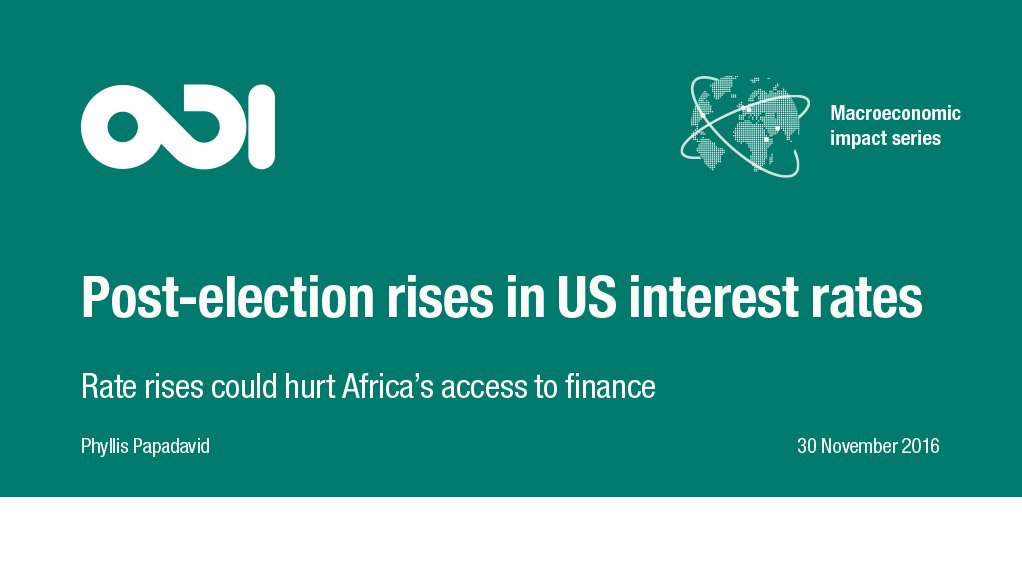- Post-election rises in US interest rates: rate rises could hurt Africa's access to finance0.13 MB
Key messages
- Post-US election, the increase in longer-dated US bond yields partly reflect expected fiscal easing that could increase US debt over the medium- to longer-term.
- Increased fiscal spending and the knock-on impact on US growth and inflation could result in faster policy rate rises by the Federal Open Market Committee, leading to global volatility.
- Sustained interest rate rises could affect the cost of finance for sub-Saharan African economies already vulnerable as a result of depreciating currencies and slowing growth.
Potential US debt rises amid fiscal easing
In the wake of Donald Trump’s US election victory, one notable financial market impact has been the increase in longer-dated US bond yields. The catalyst has been the expectation of president-elect Trump’s fiscal stimulus, and the expectation that his investment spending plans will boost US growth and, potentially, US debt. This has had global knock-on effects: the corollary of these higher interest rates has resulted in an approximate $1 trillion decline in global bond prices given the links between US and global bond yields.
A detailed Trump policy agenda remains unclear. However, the expected fiscal easing, including in the form of tax cuts, is estimated to increase US federal debt by $7.2 trillion over the next decade. If carried out, the magnitude of fiscal easing could lead to further increases in long-term US interest rates given expectations that it will increase the debt burden in the US. To the extent that the policies are seen as pro-growth, they could be inflationary too: a sustained rise in US interest rates will have negative impacts for developing and emerging economies’ borrowing costs.
Possible faster-pace of US policy rate rises
Financial markets are currently pricing a near-100% probability of an increase in the federal funds rate (currently at 0.25%–0.50%) at the much anticipated 13-14 December US Federal Open Market Committee (FOMC) meeting. Unsurprisingly, attention has now turned to how US interest rate rises will evolve in the longer-term given the likely prospect of further increases by the FOMC after a December rate rise. If the FOMC delayed raising interest rates amid potential fiscal easing, it would face the risk of abruptly increasing interest rates later on to keep the economy from overshooting its employment and inflation objectives.
Some of the rise in US interest rates will depend on the degree to which Trump’s planned fiscal easing translates into higher growth. There could also be institutional risk when it comes to US policy rates: Federal Reserve chair Yellen has stated she will remain in post until her term ends in February 2018. A new Fed chair who is more inward-looking and aligned with some of president-elect Trump’s other policies, may lead to global developments (and global financial volatility stemming from the FOMC’s actions) having less bearing on the Fed’s deliberations. The result could be an even further increase in global volatility.
Higher US yields could hurt Africa’s access to finance
If sustained, US rate rises could have multiple channels of transmission to sub-Saharan African (SSA) economies – and contribute to increased financing costs. Open economies’ long-term rates are often influenced by global risk premia, which could rise with the re-allocation of capital away from emerging and developing economies to the US. A steeper US yield curve slope, or a rise in long-term versus short-term rates, therefore could imply higher longer-term financing costs for those developing or emerging economies looking to borrow. In some instances, the US yield curve is a better predictor than emerging economies’ own domestic interest rates in influencing economic outcomes.
Growth trajectories have diverged within SSA. However, creditworthiness could be tested for those economies with already slower growth as a result of weak commodity prices and reduced government revenues, which could be further exacerbated by potential rate increases. Particularly vulnerable are SSA countries with depreciating currencies, compounding the cost of servicing sovereign and corporate dollar debt as US interest rates rise. Examples of this exposure can be seen in Nigeria, Zambia and Mozambique: their currencies have depreciated by 73%, 54% and 40% respectively, relative to end-2015. In particular, Nigeria’s naira was partly driven down by its de-pegging against the US dollar earlier this year.
SSA’s issuing of debt has become a key financing strategy in the recent past as countries have looked to global financial markets to facilitate domestic investment. Higher US interest rates could narrow the scope for this financing, including for infrastructure and to further develop domestic sovereign bond markets. Interest rates have already started to clip higher in the larger SSA economies with more developed financial sectors, such as Kenya’s. If sustained, increases in US interest rates could reduce the ability of SSA governments to effectively raise this level of finance, at a time when credit inflows and economic growth are already slowing.
Report by the Overseas Development Institute
EMAIL THIS ARTICLE SAVE THIS ARTICLE
To subscribe email subscriptions@creamermedia.co.za or click here
To advertise email advertising@creamermedia.co.za or click here











